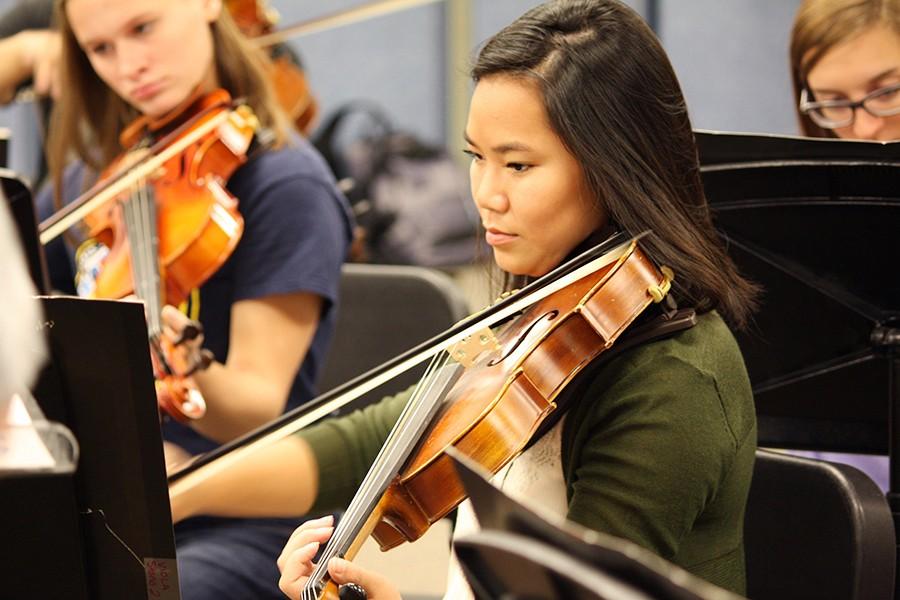Courage–
Porter overcomes challenge through blogging online
Rachel Porter, senior, plays the viola in the Advanced Orchestra. Because of Usher Syndrome, she must learn to adapt to the challenges of losing her hearing in all aspects of her life. Music will be one of the most difficult obstacles because hearing is a very important part of playing an instrument.
September 23, 2015
Senior year is a hectic year. There are college applications to be filled out, ACTs and SATs to be taken, Homecoming, Prom, football games and much more.
And besides planning for all those things, Rachel Porter, senior, found out she has Usher Syndrome just two weeks before her senior year started.
Usher Syndrome is a genetic disorder that will lead to loss of vision and hearing.
Porter was adopted when she was nine months old from China. She has always had a hearing impairment, but as of her sophomore year, she realized she had night-blindness too.
Porter started noticing while preparing for the Golden Girls’ Spring Show. All of the other girls could see in the dark except for her.
She went to the eye doctor and a specialist at Shawnee Mission Hospital over this past summer, and they confirmed that she does have night-blindness, but also that the rods in her eyes don’t work and she has dark spots around her retinas.
Those conclusions from the exam indicate that she has Usher Syndrome.
Usher Syndrome can take anywhere from just one year for the effects to start taking place or up to 17 plus years. It varies from patient to patient. Approximately 17,000 people in the United States live with it.
“I was really shocked when finding out. My mom and I were joking about how it was probably nothing,” Porter said.
Porter’s family has had mixed reactions to the news.
“My mom took it really hard, and she is still having a hard time with it. She is rushing to get everything done,” Porter said.
Porter’s sisters don’t fully understand her condition or how it affects her life.
Overall, her family has been supportive, but so have her friends, peers and teachers.
“I went on a retreat after finding out. I didn’t want to be angry, so I reversed my feelings to spread love instead of anger,” Porter said.
Porter decided to speak out about her situation through a “series” of blogs. She wanted to do it so she could come to terms with her situation. The church retreat helped her turn to God and spread love. She wanted to commit to helping others because she knows how it feels to “be alone.”
She didn’t start the blog to help herself; it was solely to help others who are going through a hard time.
Porter’s blogs can be found online at Scrawled Thoughts at scrawledstories.wordpress.com/author/rachhhporter/.
Her blog has four parts. The first part is about herself and her story. The second part is about the cane lesson she had to have and her experience while learning. The third blog is about how she hears. Finally, the last blog is about how it is okay to cry.
Overall, the blogs are about life, faith, and overcoming challenges.
“I wanted to spread my blog over social media because it’s a cool way to share my story without having to repeat it to every single person who finds out about my situation,” Porter said.
Her blog has gone outside of the local schools and Olathe area. It has gone all the way to Arizona, Illinois and even Pennsylvania.
“My blog spread through social media faster than I expected. It got over 5,000 views the first night,” Porter said.
Porter’s peers have showed her and her blog support. “People would comment on my blog and send me DMs saying my stories have helped them,” Porter said.
People have been coming up to Porter and hugging her, letting her know that she has been an inspiration to them and has helped them in a positive way.
“I want people to take away that it will be okay. I can’t tell them how it will work out, but I can tell them to stay strong,” Porter said.
Porter’s parents have not only been supportive throughout this process, but they have always been supportive of her love of music and dance.
Even though Porter’s condition has added a challenge to her life, she still plans on doing what she loves. She wants to continue dancing because it is an outlet that works for her.

